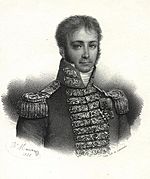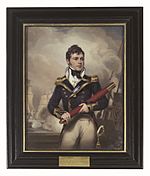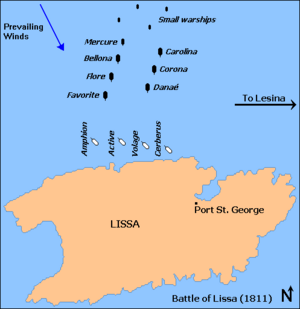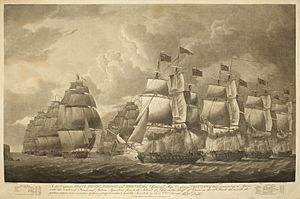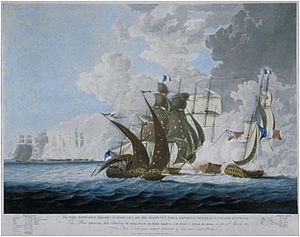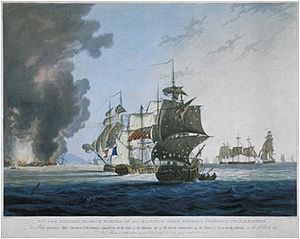Battle of Lissa (1811) facts for kids
Quick facts for kids Battle of Lissa |
|||||||
|---|---|---|---|---|---|---|---|
| Part of the Adriatic Campaign of the Napoleonic Wars | |||||||
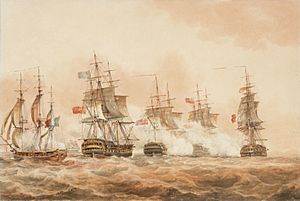 Battle of Lissa, 13 March 1811, Nicholas Pocock |
|||||||
|
|||||||
| Belligerents | |||||||
| Commanders and leaders | |||||||
| Strength | |||||||
| 3 frigates 1 post ship |
6 frigates 1 brig 2 schooners 1 xebec 2 gunboats |
||||||
| Casualties and losses | |||||||
| 45 killed 145 wounded |
700 killed, wounded and captured 2 frigates captured 1 frigate destroyed |
||||||
The Battle of Lissa, also known as the Battle of Vis, was a big naval battle. It happened on March 13, 1811, during the Napoleonic Wars. A small group of British ships fought a much larger group of French and Italian ships.
The battle took place in the Adriatic Sea, near the important island of Vis (called Lissa back then). The British used Vis as a base to stop French ships. France needed to control the Adriatic Sea to supply their army. So, they sent a large force to capture the island.
The French invasion force was led by Bernard Dubourdieu. But Captain William Hoste and his four British ships were waiting. In the battle, Hoste's ships sank the main French ship. They also captured two other enemy ships and scattered the rest. This battle was a big British victory. Hoste even used a famous signal, "Remember Nelson," before the fight began.
Contents
Why the Battle Happened
The Napoleonic Wars were a series of conflicts involving Napoleon and his European enemies. By 1809, Napoleon controlled most of the Adriatic Sea. He gained control of the Illyrian Provinces (parts of modern-day Croatia and Slovenia). This allowed him to move troops and supplies to the Balkans.
The British Royal Navy wanted to stop Napoleon's plans. In 1807, they took control of the island of Lissa. From there, they attacked French ships carrying supplies. This caused problems for the French army.
To fight back, France started building more warships. They also sent their own ships to protect their trade. Commodore Bernard Dubourdieu led the French and Italian forces. He tried to catch the smaller British force, led by Captain William Hoste. But Hoste was too clever.
In October 1810, Dubourdieu landed 700 Italian soldiers on Lissa. But the British officers in charge had moved everyone and everything to the mountains. The Italian troops burned some ships but left after only seven hours.
In early 1811, the British started raiding again. This made Dubourdieu plan a second invasion of Lissa. He gathered six frigates and many smaller ships. He also brought over 500 Italian soldiers. Dubourdieu's force was much bigger and had more firepower than Hoste's. He planned to defeat Hoste's ships, then capture the island.
The Battle Begins
Dubourdieu's fleet had six frigates, a brig, two schooners, a xebec, and two gunboats. Three ships were French, and the rest were Italian. They also carried 500 soldiers. Captain Hoste's fleet had three frigates and one smaller post ship.
At 3:00 AM on March 12, 1811, the British spotted Dubourdieu's ships. The British ships lined up near the north coast of Lissa. By 6:00 AM, Dubourdieu's ships were getting closer. He planned to break the British line in two places and attack them from both sides.
As the ships got closer, Hoste remembered Nelson's famous signal from the Battle of Trafalgar. He raised his own signal: "Remember Nelson!" The British crews cheered loudly.
Dubourdieu realized he couldn't break the British line as planned. Instead, he decided to attack Hoste's ship, HMS Amphion. Dubourdieu had more men, including soldiers, and hoped to board the British ships.
At 9:00 AM, the British ships fired first. They hit the leading French ships, Favorite and Danaé. Dubourdieu had gathered his soldiers at the front of his ship, Favorite, ready to board. But Hoste had a surprise. He had a large cannon on Amphion's deck loaded with hundreds of musket balls. When Favorite was very close, Hoste ordered the cannon to fire. It swept the front of Favorite clean, killing dozens of French and Italian soldiers. Commodore Dubourdieu was killed, leaving Colonel Gifflenga in charge of Favorite.
Hoste's Clever Move
After Dubourdieu died, Captain Péridier on the French ship Flore ordered the French and Italian ships to attack the British line directly. The damaged Favorite tried to circle Amphion to attack her from the side. The rest of the French and Italian ships followed.
But Hoste was ready. He ordered his ships to turn quickly, reversing direction. This move confused the French and Italian ships. Favorite, which had lost most of its officers, couldn't react fast enough. It crashed onto the rocky shore and was destroyed.
The loss of Favorite caused more confusion for the French and Italian fleet. The British ships pulled ahead. The leading French ships, Flore and Bellona, only managed to reach Amphion, which was now at the back of the British line. Amphion was caught between these two ships.
Meanwhile, the French ship Danaé attacked HMS Volage. Volage was smaller but had powerful short-range guns called carronades. These guns caused so much damage to Danaé that the French ship had to pull back. The strain of the fight damaged Volage's carronades, leaving it with only one working gun.
The Chase and End of Battle
Behind Volage and Danaé, the Italian ship Corona fought HMS Cerberus. Both ships were badly damaged. Then, Active arrived, forcing Danaé, Corona, and Carolina to retreat.
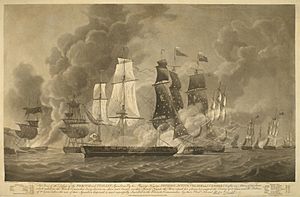
At the back, Amphion got close to Flore and damaged it so much that the French officers threw their flag overboard, meaning they surrendered. Captain Péridier was badly hurt. Amphion then attacked Bellona and forced that Italian ship to surrender too.
Hoste sent a small boat to take control of Bellona. But because Amphion was so damaged, he couldn't send a boat to take Flore. The officers on Flore quickly repaired their ship and sailed away, even though they had surrendered. This was considered a very dishonorable act in naval warfare.
Active, the only British ship still in good fighting shape, chased the retreating enemy. At 12:30 PM, it caught Corona. After an hour of maneuvering, Active forced Corona's surrender at 1:45 PM, after a fire broke out on the Italian ship.
The remaining French and Italian ships escaped to the harbor on Lesina. The battle ended because the British ships were too damaged to continue the fight.
After the Fight
Even though Favorite was destroyed, over 200 of its crew and soldiers made it to shore. They set fire to their ship and planned to march on Port St. George. But the two young British officers in charge of the town organized the locals. They told Colonel Gifflenga that if he surrendered, he would get better terms. Gifflenga realized he couldn't win and gave up.
On the captured ships, the British crews worked hard. Corona was on fire, and they fought the blaze with their Italian prisoners. Five men died, and others were burned when the main mast fell. On Bellona, the dying Captain Duodo tried to blow up his ship, but his second-in-command secretly stopped him.
Hoste was very angry that Flore had surrendered and then escaped. He sent a message demanding they return the ship. In naval battles, if a ship surrenders, it means it gives up to save lives. To abuse this rule was seen as very dishonorable. The French did not respond, and the British ships had to return to Lissa for repairs.
What Happened Next
Both sides had many casualties. The British ships had 190 killed or wounded. Captains Hoste and Hornby were both badly hurt. The French and Italian side had even more losses, estimated at over 700 killed, wounded, or captured. Commodore Dubourdieu and other captains were killed.
The British ships needed urgent repairs. The captured ships, Corona and Bellona, were later bought by the Royal Navy. Corona was renamed HMS Daedalus, and Bellona became the troopship Dover.
This battle made sure Britain had control of the sea in that area. French attempts to send more ships were stopped. The Battle of Lissa was a big win for the British. It destroyed one of the best French naval groups and stopped France from expanding into the Balkans.
Ships in the Battle
| Captain Hoste's Squadron (British) | ||||||||||
|---|---|---|---|---|---|---|---|---|---|---|
| Ship | Type | Guns | Navy | Commander | Casualties | Notes | ||||
| Killed | Wounded | Total | ||||||||
| HMS Active | Fifth rate | 38 | Captain James Alexander Gordon | 4 | 24 | 28 | ||||
| HMS Amphion | Fifth rate | 32 | Captain William Hoste | 15 | 47 | 62 | ||||
| HMS Volage | Sixth rate | 22 | Captain Phipps Hornby | 13 | 33 | 46 | ||||
| HMS Cerberus | Fifth rate | 32 | Captain Henry Whitby | 13 | 41 | 54 | ||||
| Total British Casualties: 45 killed, 145 wounded, 190 total | ||||||||||
| Commodore Dubourdieu's Squadron (French and Italian) | ||||||||||
|---|---|---|---|---|---|---|---|---|---|---|
| Ship | Type | Guns | Navy | Commander | Casualties | Notes | ||||
| Windward Division | ||||||||||
| Favorite | Fifth rate | 40 | Commodore Bernard Dubourdieu † Captain Antonie-Francois-Zavier La Marre-la-Meillerie † |
~150 | Drove ashore and was destroyed. | |||||
| Flore | Fifth rate | 40 | Captain Jean-Alexandre Péridier | unknown | Surrendered but later escaped. | |||||
| Bellona | Fifth rate | 32 | Captain Giuseppe Duodo † | ~70 | Captured and later joined the Royal Navy as HMS Dover. | |||||
| Leeward Division | ||||||||||
| Danaé | Fifth rate | 40 | Captain Villon | unknown | ||||||
| Corona | Fifth rate | 40 | Captain Nicolò Pasqualigo | unknown | Captured and later joined the Royal Navy as HMS Daedalus. | |||||
| Carolina | Fifth rate | 32 | Captain Giovanni Palicuccia | unknown | ||||||
| Dubourdieu's squadron also had the 16-gun brig Mercure, two small schooners (Principessa Augusta and Principessa di Bologna), the xebec Eugenio, and two gunboats (one named Lodola). They also carried about 500 Italian soldiers. | ||||||||||
| Total French and Italian Casualties: approximately 700 killed, wounded, or captured | ||||||||||
| Sources: Gardiner, p. 173; Henderson, p. 112; James, p. 351; Smith, p. 356; Woodman, p. 253 | ||||||||||
Key
- A † symbol means the officer was killed or died from wounds.
- Ships are listed in the order they lined up for battle.
 = Royal Navy (British Navy)
= Royal Navy (British Navy) = French Navy
= French Navy = Navy of the Kingdom of Italy
= Navy of the Kingdom of Italy
 | Percy Lavon Julian |
 | Katherine Johnson |
 | George Washington Carver |
 | Annie Easley |


